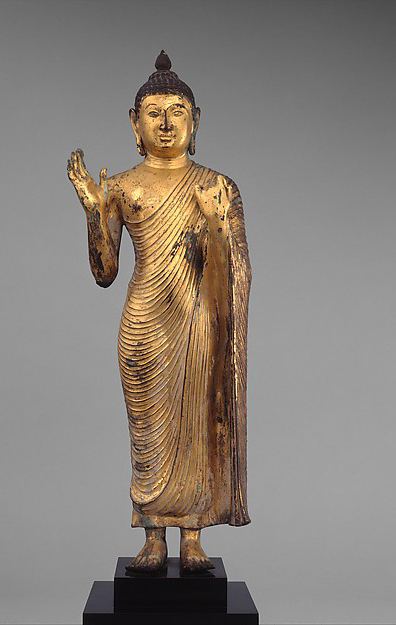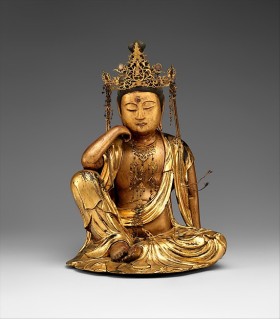 I would like to begin by emphasising that ‘judging mind’ has nothing to do with what we might call ‘discerning mind’. Compulsiveness is at the heart, at the core of, ‘judging mind’; and this compulsive quality is a big hindrance to the act of understanding.
I would like to begin by emphasising that ‘judging mind’ has nothing to do with what we might call ‘discerning mind’. Compulsiveness is at the heart, at the core of, ‘judging mind’; and this compulsive quality is a big hindrance to the act of understanding.
On the other hand, the discerning mind, especially when it reaches a certain stage of development, is characterised by receptivity; it is characterised basically by humility, supported by humility. It seems to me that humility may be the highest form of nonjudgemental intelligence. Perhaps this is why T.S. Eliot says, I think it was in the Four Quartets, ‘Humility is endless.’
So, ‘discerning mind’ has something to do with humility. In a sense, ‘discerning mind’ is an empty mind, whereas ‘judging mind’, on the contrary, is clogged up with opinions and attachment to those opinions. I think we could say that ‘judging mind’ is a mind which always already knows; all the time it already knows. So there is something solid, something hard, in the judging mind. In the discerning mind, however, there is something soft and free, light and flowing.
‘Judging mind’, then, is obviously the opposite of true mindfulness, which is nonjudging attention. And it is also, obviously, the opposite of the four Brahma Viharas — loving kindness, compassion, sympathetic joy, and equanimity. In other words, the judging mind is the opposite of the forgiving mind. This is why ‘judging mind’ is a crucial area, I think, for study and practice.
What is the judging mind in traditional terms? It is a manifestation of the three main intoxicants — attachment, aversion, and ignorance; it is a manifestation through words plus an emotional charge — mental words or actual words. And we should remember that, in the teaching of the Buddha, whenever attachment, aversion, or ignorance manifest themselves, there is what is called anusaya — a seed for further attachment, for further aversion, and for further ignorance. An act of attachment or an act of aversion doesn’t end there without any consequences, it is also a seed for further attachment and aversion. Of course, the same is true of generosity — it is a seed for further generosity. This is the law of karma.
Judgements — acts of attachment, acts of aversion, — therefore, are also seeds for further attachment and aversion. This means, basically, that ‘judging mind’ is suffering, and ‘judging mind’ is a cause for further suffering. The invaluable benefit of the practice is that it can show us, usually in a very gradual way, this distinct quality of suffering which is connected with ‘judging mind’.
Gradually, we start perceiving in a very distinct way the cutting character, the separation and the suffering which is conveyed by the judging mind. Usually it takes time because ‘judging mind’ is a very strong addiction, and you don’t step out so easily when you have a powerful addiction; we become dependent on the judging mind. Each of us can think of situations where, maybe by virtue of mindfulness, we realise that we have to choose which judgements to use. And, if we can’t use our favourite ones, then anything goes, provided we can issue judgements — this is addiction.
And, since it has to do with the fundamental intoxicants, it is a very deep addiction. That’s why it takes patience, trust and perseverance in the practice for the judging mind to gradually stand out as a powerful form of suffering which we have been passionately cultivating — let’s face it!
 The organic development of the practice, of the insight which is generated by the practice, is indispensable, otherwise we may easily fall into some sort of moralist attitude, like the judging mind, and we become even more stuck. ‘Judging mind’ is something to be understood and transcended; it’s not something to be judged. It seems obvious, but it’s not. We keep falling into this trap — again and again. But it’s through the falling that we learn.
The organic development of the practice, of the insight which is generated by the practice, is indispensable, otherwise we may easily fall into some sort of moralist attitude, like the judging mind, and we become even more stuck. ‘Judging mind’ is something to be understood and transcended; it’s not something to be judged. It seems obvious, but it’s not. We keep falling into this trap — again and again. But it’s through the falling that we learn.
Now, ‘discerning mind’ and ‘judging mind’ can look the same from the outside. I may think that a particular person, for instance, is rather false, is not a truthful person. Is this ‘discerning mind’ or ‘judging mind’? What’s the difference between the two minds? We may have the same statement, but in the judging mind, the same statement is accompanied by aversion. The discerning mind, on the other hand, is equanimous. They say the same thing, but ‘discerning mind’ says it from a peaceful place, from a nonreactive place, and ‘judging mind’ says it from a reactive place.
‘Judging mind’ is very fixed, rigid, whereas ‘discerning mind’ has flexibility; it has the capacity for intuition, which means, in this example, the capacity to see beyond the falseness – to see, for instance, the confusion and the suffering which is behind that falseness. If the vision is fixed, it is rigid; we just keep hammering away at how false that person is, full stop. No further development takes place.
The sterility of the judging mind stands opposite the creativity of the discerning mind. There is one opinion in the judging mind, and there is strong identification with this opinion. So, ‘judging mind’ is paralysed. The discerning mind, on the other hand, is non-identified, and so is free to move, free to see into things, and free to drop this or that opinion when appropriate; it is the opposite of rigidity.
What tends to happen with ‘judging mind’, because of the rigidity, because of the strong identification with any opinion, is that we select the information about a person, and we tend to be receptive only to that information which confirms our judgement. We are not in touch, therefore, with that person; we are in touch only with our judgement of that person. It is very alienating; it is dukkha. And yet we can be completely unaware of this happening. That’s why we need retreats, for instance. Special, sometimes painful devices may enable us to see this thing which we can’t see, so to speak, with the naked eye.
‘Judging mind’ loves comparing. And there is a whole variety of comparing that is possible. Some of us are specialists in comparing with the past; some of us specialise in comparing with what could have been; some of us are good at all varieties of comparison. This, again, has consequences — separation, barriers, alienation. You know, I think that the greatest contradiction is that we ardently want peace, warmth, and unity, and yet equally ardently work for conflict, suffering, separation and alienation. This is the greatest contradiction and, once again, is another aspect of dukkha. The Buddha simply said: ‘I teach only one thing — dukkha and the end of dukkha.’
When you have rigidity — and we are talking about the judging mind — what happens is that you don’t see change, or you have a very hard time seeing change. That picture we have, say, of ourselves or of another person, is a changeless picture, and it is because of this strong identification, this strong attachment, which is typical of the judging mind. So, we don’t see the flowing nature of things; we don’t see the complexity — impermanence implies complexity; we don’t see the intertwining of positive and negative sides in ourselves, in other people. We get fixated on one or two images, and we don’t see the flow, the complexity.
Moreover, if we are in the grips of a judging mind, we do not see the conditional aspect of things — what in this tradition is called ‘nonself’, anatta. For example, if, or so it seems, someone has some hostility towards us, and if we are in the grips of the judging mind, we tend to experience that hostility as a free choice of the other person — you know, a deliberate, free, cruel, choice — completely free of the other person.
The Buddhist poet Shantideva of the eighth century says something interesting. He says, ‘If someone hits you with a stick, you don’t get angry at the stick, because the stick was moved by that person. Now, that person was moved as well. So why do you get angry at the person?’
In the same way as the stick is moved by the person, then, the person is moved by a whole set of conditions, and our reaction is equally moved by a number of conditions. If we are stuck in the judging mind, we do not see this great law of conditionality — we don’t see the flowing nature of things, and — let’s keep in mind the example of hostility — we don’t see the obvious suffering in which the hostility is rooted. That is because we tend to see it as the happy, free choice of the other person. We are blind, therefore, because of the judging mind; we are blind to what, in the Buddha’s teaching, are called the three fundamental marks of existence, which is no small thing, and this is not a small consequence of cultivating ‘judging mind’.
 There is another angle from which we can see this. The Buddha talked about unwise attention, ayoniso-manasikara. Suppose we have a special dislike for someone, and suppose that person appears. Our attention may become extremely sharp because we are eager to see all the inappropriate things that this person is about to do or say. Now, this is unwise attention. This is strong, very sharp attention, but it is unwise because it just creates suffering. ‘Judging mind’ is rooted in ayoniso-manasikara, in unwise attention.
There is another angle from which we can see this. The Buddha talked about unwise attention, ayoniso-manasikara. Suppose we have a special dislike for someone, and suppose that person appears. Our attention may become extremely sharp because we are eager to see all the inappropriate things that this person is about to do or say. Now, this is unwise attention. This is strong, very sharp attention, but it is unwise because it just creates suffering. ‘Judging mind’ is rooted in ayoniso-manasikara, in unwise attention.
On the other hand, ‘discerning mind’ is rooted in yoniso-manasikara, in wise attention. Wise attention, very simply — let us stay with the same example — is the capacity to see the same thing, to look at and contemplate the same scene, and yet to see the suffering which is created by that kind of unwise attention which leads to attachment and aversion.
I don’t think that ‘judging mind’ necessarily only produces negative judgements; sometimes a judgement can be positive. Again, however, it will be rigid; aversion will be waiting just around the corner. A positive judgement doesn’t want to be questioned; not even a little bit. Maybe it’s a positive judgement about ourselves, about someone else, or about a situation, but it is very frail. If someone questions it, the judging mind won’t accept it. This is because of rigidity. Aversion is implicit; it is there in the background even if it is not in the foreground.
In a way, the judgements of the judging mind are like marks carved in stone — this is a famous Hindu metaphor. Whereas the judgements of the discerning mind are like marks in sand or water. In other words, in the discerning mind there is a depth of understanding, nothing is clung to, nothing is wrapped up and kept in a drawer. The difference between ‘judging mind’ and ‘discerning mind’ is the difference between being a prisoner and being free — by various degrees, of course.
There is also a subtle aspect I would like to mention regarding ‘judging mind’. This is mental gossip. It is subtle and insidious; and it can become pretty heavy. A retreat is a wonderful place to get in touch with this.
I was here once on a long retreat, and I remember that after sitting for weeks with my back to the window, for some reason I changed to facing the window. For some reason, I felt a kind of relief at being in this new position. So I investigated this relief, and the reason for it became very clear. For weeks I had been watching my fellow yogis standing in line, taking food, eating, and sitting — a very innocent movie — but my comments were heavy. You know, comparing, or commenting to myself, ‘He’s helping himself for the second time. . . for the third time!’ Or, ‘He’s changed his socks,’ and so on. But now, facing the window, I was free of many of my comments. It was a big relief! There was just the sky and that beautiful tree.
The commentaries can go on, maybe in the background and not dramatically, but they can increase the heaviness, the rigidity, the congestion of the judging mind, and there is lack of space.
There was another moment — I think it was in 1976; it was the first three-month course at IMS — and I remember sitting under a maple tree beseeching my mind to leave me alone. There had been hours of judgements, an eruption of them, one after the other. That was dramatic. Mental gossip is less dramatic, but also to be examined and investigated.
Now, how do we work with the judging mind? I would say that our entire practice converges into working with it, in direct and indirect ways. In the Anguttara-Nikaya, the Buddha says that the mental intoxicants, the kilesas — attachment, aversion, and ignorance — are overcome and abandoned, not by virtue of speech, or by virtue of action, but by seeing and understanding them. The Pali texts emphasise this — ‘seeing and understanding them’. We can accomplish great things, noble actions, but that doesn’t solve the issue. The solution, and solution is akin to liberation, comes from the seeing and understanding, repeatedly.
 More specifically I would say that we need a certain steadiness as a basis, mind steadiness, which comes from good work with the body, breath, bodily sensations; something in which we can feel anchored. And then our practice may be vipassana, but also metta, loving kindness, compassion. It can be a specific practice, or it can be something which grows without words in the practice of mindfulness. Krishnamurti used to talk about ‘affectionate observation’. Once we have a certain mental stability, and have developed some capacity for affectionate observation, then we are equipped to work with the judging mind.
More specifically I would say that we need a certain steadiness as a basis, mind steadiness, which comes from good work with the body, breath, bodily sensations; something in which we can feel anchored. And then our practice may be vipassana, but also metta, loving kindness, compassion. It can be a specific practice, or it can be something which grows without words in the practice of mindfulness. Krishnamurti used to talk about ‘affectionate observation’. Once we have a certain mental stability, and have developed some capacity for affectionate observation, then we are equipped to work with the judging mind.
I see two great advantages in working with the judging mind. The first one is that we can work with the intoxicants, with attachment and aversion, in a very tangible way. There are these statements, these words, judgements, and we can look at them. Often, they are shouted in our minds, and maybe not only in our minds. This is a very practical access for attending to the fundamental work, with the causes of suffering. We can do this, once we have that basis mentioned before. Otherwise we may easily fall into moralising, into judging, judging.
And the other reason I find the work with the judging mind to be very important, is that we can see how we have built up our egos, the ‘I-mine’. Constant judging solidifies ego, solidifies the other person — ‘I think this,’ ‘I think that,’ ‘This is so,’ ‘This is not so . . . ’
Working on the judging mind is not easy, but it is a very practical access to the fundamental work. And, of course, it is also the access to developing ‘discerning mind’. We get to a more discerning mind through the gradual dissolving of the judging mind. The two things are closely connected.
What is it that is helpful? Well, personally, I find that feeling the presence or absence within us of the judging mind, is the first thing. I also find that a combination of mindfulness of the judging mind plus loving kindness, metta, practice is very helpful. When judgements start arising, if we are mindful, we can replace them with a metta phrase. At the beginning it may feel artificial, but as time goes by, it doesn’t feel artificial any more. We then begin to wonder how we could have indulged so much in the opposite, and we find, sometimes, that replacing judging with metta is a deeply natural thing to do. Finally, we begin to honour our real nature, and the opposite becomes artificial.
Perceiving the power of separation caused by the judging mind is also very helpful. In other words, the judging mind creates more inner solitude. It could be characterised as cold and ego-oriented. Now, the great transition is from an ego-oriented way of looking at things, ‘judging mind’, to a more dharmic way of looking at things, by which I mean a warmer and more impersonal way of looking at things.
Warm and impersonal — yes! We usually say ‘cold and impersonal’. We may say, ‘This is my fear,’ because of what this and that person said. ‘This is my anger,’ because of what this person did to me, etc. But we can also say, ‘suffering’, full stop. We frequently miss the truth when we start proliferating around our fear or our anger; we miss the truth, and the truth is suffering. And it’s not particularly ours. From the moment we realise that this is suffering, and suffering doesn’t belong to us, it’s a common feature, it’s not special — then something warmer arises in us. This is why ‘warmer and impersonal’ is quite an accurate thing to say. So, do we want to cultivate something which is cold and ego-oriented, or do we want to cultivate something which is warm and impersonal? As Aldous Huxley would say, ‘The choice is always ours.’
First published in the November 1998 Buddhism Now.
Click here to read more teachings from Corrado Pensa
Categories: Beginners, Buddhism, Corrado Pensa, Foundations of Buddhism

Thank you for this it has helped me alot I find that my practice has shown me just how much the judging mind is in my life
Thank you for explaining the differences between judging mind and discerning mind, rigidity versus free flowing. That discernment is compassionate. Also something that resonated with me was the famous Hindu metaphor: the judgments of the judging mind are like marks carved in stone; the judgments of the discerning mind are like marks in sand. Simple really–but difficult to work with. Namaste.
Thank you so much for this post. I have been thinking on how to tackle and solve the problem of my “judging mind” in my practice. This post came along just at the right time for me to ponder and learn about this skillful practice. The explanation is very clear and comprehensive. This is a positive judgement with much gratitude from me. :)
I’m not going to judge this post…
Ouch!
Me neither!!
😀 🙏
I can see all of the judging going on in my mind and have made some progress in recognizing it and letting it go but your very insightful pointers make it all much more understandable. I will be pondering this for a long time. Thank you.